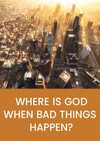Are you sure?
This bookmark will be removed from all folders and any saved notes will be permanently removed.
Where is God when bad things happen? Part 2: Responding to emergencies
with Diana Davis Butler
The news coming out of emergency situations often features images of first responders. But for this 9-1-1 dispatcher, a split second of turning to God as she snapped into action proved time and again that there's a place for a spiritual first response—and that God's help really is there in an emergency.
Also available in German.
Enjoy 1 free Sentinel article or audio program each month, including content from 1898 to today.
JSH Collections
This audio program is included in:
2021 - PODCAST SERIES
Where is God when bad things happen?
JSH-Online has hundreds of pamphlets, anthologies, and special editions for you to discover.



